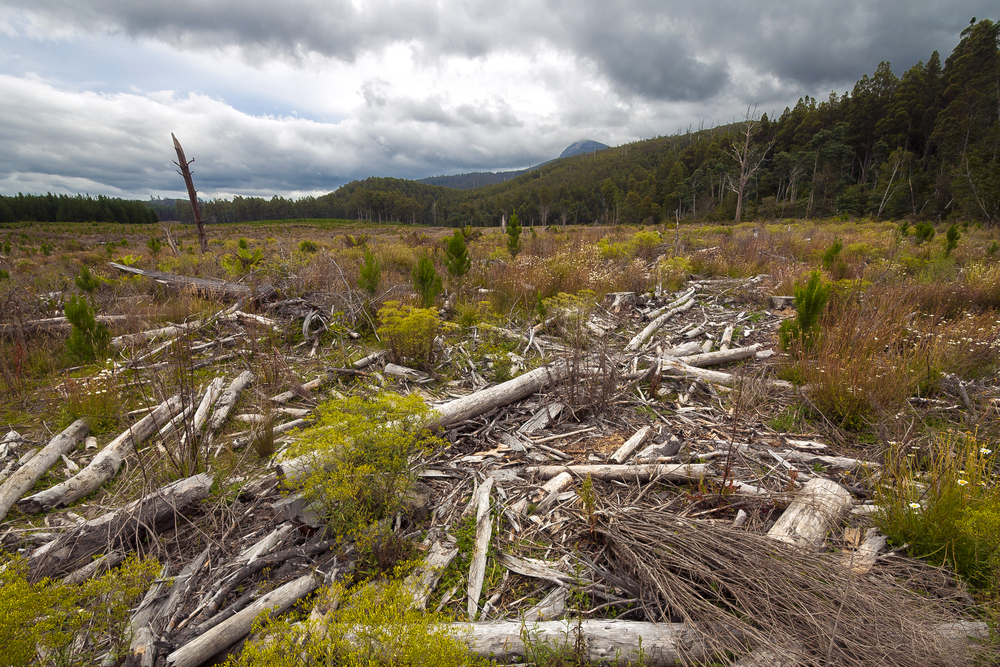Takayna / the Tarkine is an area of temperate rainforest, dunes and coastal heathland in north-western Tasmania, renowned for its outstanding beauty, biodiversity and Aboriginal cultural heritage.
EDO Tasmania has represented the Tarkine National Coalition (TNC, also known as Save the Tarkine) in a range of actions challenging mining projects in takayna / the Tarkine, that have the potential to impact on its biodiversity values including on the threatened Tasmanian devil and on the significant temperate rainforest, some of the last in the world.
Livingstone and Mount Lindsay Leases
In 2015, the Tasmanian Minister for Resources granted mining leases to Venture Minerals for two mines – the Mt Lindsay and Livingstone mines. These tin mining projects are not insubstantial. Mount Lindsay alone has reported the potential to mine 58Mt of tin/tungsten over its lifetime.
When the Minister refused to give Tarkine National Coalition reasons for the decision to grant mining leases, EDO represented the group in an appeal to the Supreme Court. The Minister argued that the TNC was not a person “aggrieved” and did not have standing.
On 10 March 2016, Justice Wood held that TNC was entitled to a statement of reasons, noting that a decision authorising mining in takayna / the Tarkine would clearly adversely affect TNC’s interests. The Court ordered the government to provide the statement of reasons.
The Tasmanian Government appealed against this decision. The appeal was heard on 19 August 2016, and only one week later the Full Court returned a unanimous judgment upholding Justice Wood’s earlier decision.
In dismissing the appeal, Justice Estcourt observed:
“There is no merit in the Minister’s appeal…The present appeal is, in my view, a shining example of an appeal failing to identify an error on the part of the primary judge.”
Mining leases challenged
After reviewing the statement of reasons TNC took further action. EDO represented the group in a challenge to the grant of the mining leases, heard by the Supreme Court in June 2017.
The TNC’s case was that the Minister could not have been satisfied that the criteria for granting the leases had been met. In particular, the TNC argued that the Minister did not have a copy of the mining plan or key financial information when making the decision, and did not turn his mind to the risks and benefits of the proposal.
On 23 June 2017, the Tasmanian Supreme Court dismissed the TNC’s applications. In his judgment, his Honour found that the Ministers could rely on summaries of the mining lease applications prepared by Departmental staff and, taking into account the information provided in those summaries, it could be inferred that the Ministers were satisfied the relevant legislative criteria were met.
While unsuccessful, this decision has provided much needed clarity around the Minister’s power in granting mining leases.
This case was the first time the Court had been asked to review decisions relating to the grant of mining leases in Tasmania and raised important questions of law about the exercise of Ministerial powers under the Mineral Resources Development Act 1995 (Tas).
To read a full copy of the Supreme Court decision (which includes copies of the Statements of Reasons provided by the Minister), click here.
Shree Minerals: Mine Waste Storage
Shree Minerals operate an open cut iron ore mine near Nelson Bay River in North-West Tasmania, known as the Nelson Bay River.
In 2014, the EPA Director amended the mine’s permit conditions regulating storage of potentially acid-forming waste.
The Director had authorised temporary above ground storage of waste, after it was revealed that the mine would produce approximately 20 times more waste than originally approved. However, in considering the original application, the EPA Board had expressly ruled out above ground storage because of the risk of contamination.
EDO represented TNC in a challenge to the amendment, arguing that it was beyond power. On 17 December 2014, the Supreme Court upheld the challenge, holding that the Director’s decision “fundamentally changed” the mine conditions imposed by the EPA Board. Justice Estcourt held that the decision went beyond the powers granted to the EPA Director under the Environmental Management and Pollution Control Act 1994 and was therefore invalid.
Shree Minerals was given 12 months to transfer the mine waste from the above-ground storage.
Protecting Devil Habitat: Riley Creek Mine
EDO Tasmania represents Tarkine National Coalition in relation to the Venture Minerals iron ore mining project at Riley Creek, 16km west of Tullah. This project would see an open cut mine to extract 2 million tonnes of iron ore over the life of the project.
TNC was concerned that the proposed mine would have a significant impact on local populations of threatened Tasmanian Devil, particularly because of increased road fatalities associated with mine traffic. TNC also raised concerns regarding the adequacy of proposed water and erosion control measures at the mine site.
EDO represented the TNC in an appeal to the Resource Management and Planning Appeal Tribunal against the Tasmanian EPA and West Coast Council’s approval of the mine.
While the Tribunal dismissed the appeal, TNC were successful in having more stringent conditions imposed on the mining operation, in particular to minimise impacts on the Tasmanian Devil.
More From Tasmania
’Extinction greenwashing’: supermarkets target of ACCC complaint over misleading salmon claims
Does Tasmania really want another thylacine on its hands?
Peak organisations urge Premier Rockliff to fix the state’s Right to Information system
Join the EDO network today to help give the environment the defence it deserves.
Take Action





